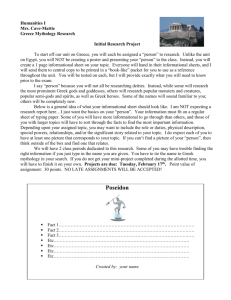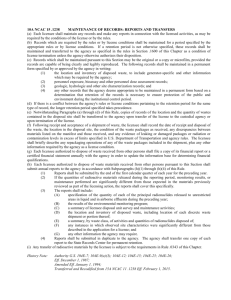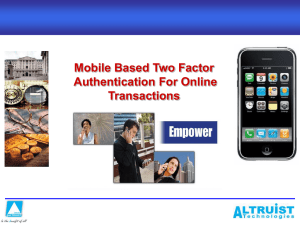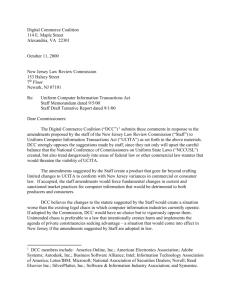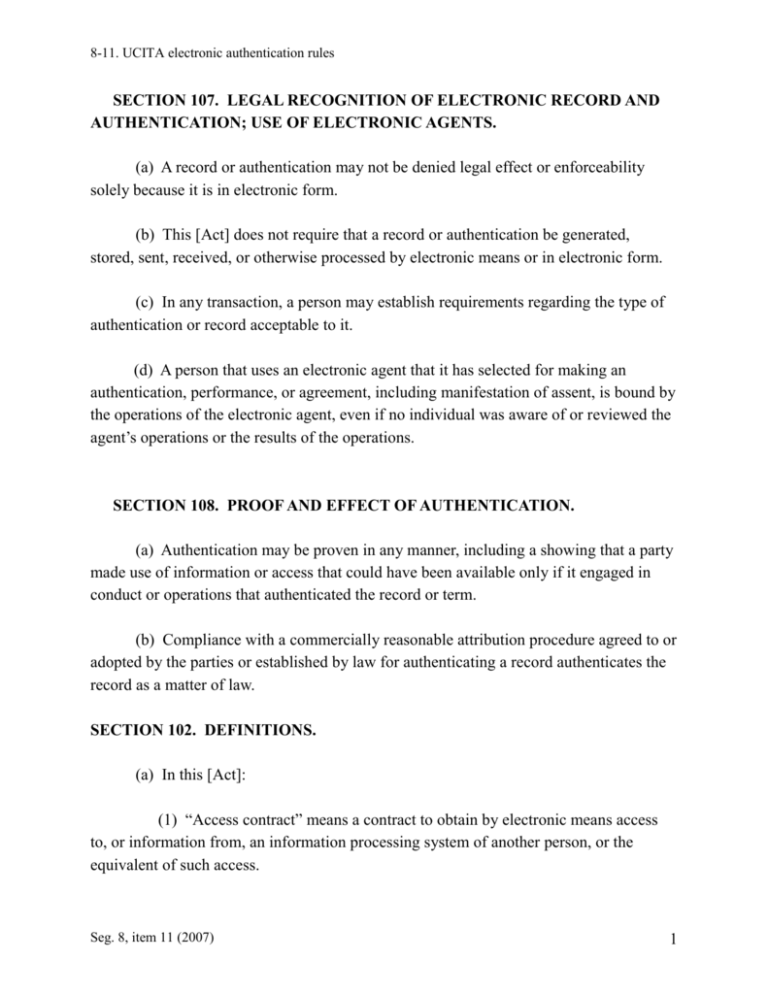
8-11. UCITA electronic authentication rules
SECTION 107. LEGAL RECOGNITION OF ELECTRONIC RECORD AND
AUTHENTICATION; USE OF ELECTRONIC AGENTS.
(a) A record or authentication may not be denied legal effect or enforceability
solely because it is in electronic form.
(b) This [Act] does not require that a record or authentication be generated,
stored, sent, received, or otherwise processed by electronic means or in electronic form.
(c) In any transaction, a person may establish requirements regarding the type of
authentication or record acceptable to it.
(d) A person that uses an electronic agent that it has selected for making an
authentication, performance, or agreement, including manifestation of assent, is bound by
the operations of the electronic agent, even if no individual was aware of or reviewed the
agent’s operations or the results of the operations.
SECTION 108. PROOF AND EFFECT OF AUTHENTICATION.
(a) Authentication may be proven in any manner, including a showing that a party
made use of information or access that could have been available only if it engaged in
conduct or operations that authenticated the record or term.
(b) Compliance with a commercially reasonable attribution procedure agreed to or
adopted by the parties or established by law for authenticating a record authenticates the
record as a matter of law.
SECTION 102. DEFINITIONS.
(a) In this [Act]:
(1) “Access contract” means a contract to obtain by electronic means access
to, or information from, an information processing system of another person, or the
equivalent of such access.
Seg. 8, item 11 (2007)
1
8-11. UCITA electronic authentication rules
(2) “Access material” means any information or material, such as a document,
address, or access code, that is necessary to obtain authorized access to information or
control or possession of a copy.
(3) “Aggrieved party” means a party entitled to a remedy for breach of
contract.
(4) “Agreement” means the bargain of the parties in fact as found in their
language or by implication from other circumstances, including course of performance,
course of dealing, and usage of trade as provided in this [Act].
(5) “Attribution procedure” means a procedure to verify that an electronic
authentication, display, message, record, or performance is that of a particular person or
to detect changes or errors in information. The term includes a procedure that requires
the use of algorithms or other codes, identifying words or numbers, encryption, or
callback or other acknowledgment.
(6) “Authenticate” means:
(A) to sign; or
(B) with the intent to sign a record, otherwise to execute or adopt an
electronic symbol, sound, message, or process referring to, attached to, included in, or
logically associated or linked with, that record.
(7) “Automated transaction” means a transaction in which a contract is formed
in whole or part by electronic actions of one or both parties which are not previously
reviewed by an individual in the ordinary course.
(8) “Cancellation” means the ending of a contract by a party because of breach
of contract by another party.
(9) “Computer” means an electronic device that accepts information in digital
or similar form and manipulates it for a result based on a sequence of instructions.
Seg. 8, item 11 (2007)
2
8-11. UCITA electronic authentication rules
(10) “Computer information” means information in electronic form which is
obtained from or through the use of a computer or which is in a form capable of being
processed by a computer. The term includes a copy of the information and any
documentation or packaging associated with the copy.
(11) “Computer information transaction” means an agreement or the
performance of it to create, modify, transfer, or license computer information or
informational rights in computer information. The term includes a support contract under
Section 612. The term does not include a transaction merely because the parties’
agreement provides that their communications about the transaction will be in the form of
computer information.
(12) “Computer program” means a set of statements or instructions to be used
directly or indirectly in a computer to bring about a certain result. The term does not
include separately identifiable informational content.
(13) “Consequential damages” resulting from breach of contract includes (i)
any loss resulting from general or particular requirements and needs of which the
breaching party at the time of contracting had reason to know and which could not
reasonably be prevented and (ii) any injury to an individual or damage to property other
than the subject matter of the transaction proximately resulting from breach of warranty.
The term does not include direct damages or incidental damages.
(14) “Conspicuous”, with reference to a term, means so written, displayed, or
presented that a reasonable person against which it is to operate ought to have noticed it.
A term in an electronic record intended to evoke a response by an electronic agent is
conspicuous if it is presented in a form that would enable a reasonably configured
electronic agent to take it into account or react to it without review of the record by an
individual. Conspicuous terms include the following:
(A) with respect to a person:
(i) a heading in capitals in a size equal to or greater than, or in
contrasting type, font, or color to, the surrounding text;
Seg. 8, item 11 (2007)
3
8-11. UCITA electronic authentication rules
(ii) language in the body of a record or display in larger or other
contrasting type, font, or color or set off from the surrounding text by symbols or other
marks that draw attention to the language; and
(iii) a term prominently referenced in an electronic record or display
which is readily accessible or reviewable from the record or display; and
(B) with respect to a person or an electronic agent, a term or reference to a
term that is so placed in a record or display that the person or electronic agent cannot
proceed without taking action with respect to the particular term or reference.
(15) “Consumer” means an individual who is a licensee of information or
informational rights that the individual at the time of contracting intended to be used
primarily for personal, family, or household purposes. The term does not include an
individual who is a licensee primarily for professional or commercial purposes, including
agriculture, business management, and investment management other than management
of the individual’s personal or family investments.
(16) “Consumer contract” means a contract between a merchant licensor and a
consumer.
(17) “Contract” means the total legal obligation resulting from the parties’
agreement as affected by this [Act] and other applicable law.
(18) “Contract fee” means the price, fee, rent, or royalty payable in a contract
under this [Act] or any part of the amount payable.
(19) “Contractual use term” means an enforceable term that defines or limits
the use, disclosure of, or access to licensed information or informational rights, including
a term that defines the scope of a license.
(20) “Copy” means the medium on which information is fixed on a temporary
or permanent basis and from which it can be perceived, reproduced, used, or
communicated, either directly or with the aid of a machine or device.
Seg. 8, item 11 (2007)
4
8-11. UCITA electronic authentication rules
(21) “Course of dealing” means a sequence of previous conduct between the
parties to a particular transaction which establishes a common basis of understanding for
interpreting their expressions and other conduct.
(22) “Course of performance” means repeated performances, under a contract
that involves repeated occasions for performance, which are accepted or acquiesced in
without objection by a party having knowledge of the nature of the performance and an
opportunity to object to it.
(23) “Court” includes an arbitration or other dispute-resolution forum if the
parties have agreed to use of that forum or its use is required by law.
(24) “Delivery”, with respect to a copy, means the voluntary physical or
electronic transfer of possession or control.
(25) “Direct damages” means compensation for losses measured by Section
808(b)(1) or 809(a)(1). The term does not include consequential damages or incidental
damages.
(26) “Electronic” means relating to technology having electrical, digital,
magnetic, wireless, optical, electromagnetic, or similar capabilities.
(27) “Electronic agent” means a computer program, or electronic or other
automated means, used by a person to initiate an action, or to respond to electronic
messages or performances, on the person’s behalf without review or action by an
individual at the time of the action or response to the message or performance.
(28) “Electronic message” means a record or display that is stored, generated,
or transmitted by electronic means for the purpose of communication to another person or
electronic agent.
(29) “Financial accommodation contract” means an agreement under which a
person extends a financial accommodation to a licensee and which does not create a
security interest governed by [Article 9 of the Uniform Commercial Code]. The
agreement may be in any form, including a license or lease.
Seg. 8, item 11 (2007)
5
8-11. UCITA electronic authentication rules
(30) “Financial services transaction” means an agreement that provides for, or
a transaction that is, or entails access to, use, transfer, clearance, settlement, or processing
of:
(A) a deposit, loan, funds, or monetary value represented in electronic form
and stored or capable of storage by electronic means and retrievable and transferable by
electronic means, or other right to payment to or from a person;
(B) an instrument or other item;
(C) a payment order, credit card transaction, debit card transaction, funds
transfer, automated clearing house transfer, or similar wholesale or retail transfer of
funds;
(D) a letter of credit, document of title, financial asset, investment property,
or similar asset held in a fiduciary or agency capacity; or
(E) related identifying, verifying, access-enabling, authorizing, or
monitoring information.
(31) “Financier” means a person that provides a financial accommodation to a
licensee under a financial accommodation contract and either (i) becomes a licensee for
the purpose of transferring or sublicensing the license to the party to which the financial
accommodation is provided or (ii) obtains a contractual right under the financial
accommodation contract to preclude the licensee’s use of the information or
informational rights under a license in the event of breach of the financial
accommodation contract. The term does not include a person that selects, creates, or
supplies the information that is the subject of the license, owns the informational rights in
the information, or provides support for, modifications to, or maintenance of the
information.
(32) “Good faith” means honesty in fact and the observance of reasonable
commercial standards of fair dealing.
(33) “Goods” means all things that are movable at the time relevant to the
computer information transaction. The term includes the unborn young of animals,
Seg. 8, item 11 (2007)
6
8-11. UCITA electronic authentication rules
growing crops, and other identified things to be severed from realty which are covered by
[Section 2-107 of the Uniform Commercial Code]. The term does not include computer
information, money, the subject matter of foreign exchange transactions, documents,
letters of credit, letter-of-credit rights, instruments, investment property, accounts, chattel
paper, deposit accounts, or general intangibles.
(34) “Incidental damages” resulting from breach of contract:
(A) means compensation for any commercially reasonable charges,
expenses, or commissions reasonably incurred by an aggrieved party with respect to:
(i) inspection, receipt, transmission, transportation, care, or custody of
identified copies or information that is the subject of the breach;
(ii) stopping delivery, shipment, or transmission;
(iii) effecting cover or retransfer of copies or information after the
breach;
(iv) other efforts after the breach to minimize or avoid loss resulting
from the breach; and
(v) matters otherwise incident to the breach; and
(B) does not include consequential damages or direct damages.
(35) “Information” means data, text, images, sounds, mask works, or
computer programs, including collections and compilations of them.
(36) “Information processing system” means an electronic system for creating,
generating, sending, receiving, storing, displaying, or processing information.
(37) “Informational content” means information that is intended to be
communicated to or perceived by an individual in the ordinary use of the information, or
the equivalent of that information.
Seg. 8, item 11 (2007)
7
8-11. UCITA electronic authentication rules
(38) “Informational rights” include all rights in information created under laws
governing patents, copyrights, mask works, trade secrets, trademarks, publicity rights, or
any other law that gives a person, independently of contract, a right to control or preclude
another person’s use of or access to the information on the basis of the rights holder’s
interest in the information.
(39) “Knowledge”, with respect to a fact, means actual knowledge of the fact.
(40) “License” means a contract that authorizes access to, or use, distribution,
performance, modification, or reproduction of, information or informational rights, but
expressly limits the access or uses authorized or expressly grants fewer than all rights in
the information, whether or not the transferee has title to a licensed copy. The term
includes an access contract, a lease of a computer program, and a consignment of a copy.
The term does not include a reservation or creation of a security interest to the extent the
interest is governed by [Article 9 of the Uniform Commercial Code].
(41) “Licensee” means a person entitled by agreement to acquire or exercise
rights in, or to have access to or use of, computer information under an agreement to
which this [Act] applies. A licensor is not a licensee with respect to rights reserved to it
under the agreement.
(42) “Licensor” means a person obligated by agreement to transfer or create
rights in, or to give access to or use of, computer information or informational rights in it
under an agreement to which this [Act] applies. Between the provider of access and a
provider of the informational content to be accessed, the provider of content is the
licensor. In an exchange of information or informational rights, each party is a licensor
with respect to the information, informational rights, or access it gives.
(43) “Mass-market license” means a standard form used in a mass-market
transaction.
(44) “Mass-market transaction” means a transaction that is:
(A) a consumer contract; or
Seg. 8, item 11 (2007)
8
8-11. UCITA electronic authentication rules
(B) any other transaction with an end-user licensee if:
(i) the transaction is for information or informational rights directed to
the general public as a whole, including consumers, under substantially the same terms
for the same information;
(ii) the licensee acquires the information or informational rights in a
retail transaction under terms and in a quantity consistent with an ordinary transaction in
a retail market; and
(iii) the transaction is not:
(I) a contract for redistribution or for public performance or public
display of a copyrighted work;
(II) a transaction in which the information is customized or
otherwise specially prepared by the licensor for the licensee, other than minor
customization using a capability of the information intended for that purpose;
(III) a site license; or
(IV) an access contract.
(45) “Merchant” means a person:
(A) that deals in information or informational rights of the kind involved in
the transaction;
(B) that by the person’s occupation holds itself out as having knowledge or
skill peculiar to the relevant aspect of the business practices or information involved in
the transaction; or
(C) to which the knowledge or skill peculiar to the practices or information
involved in the transaction may be attributed by the person’s employment of an agent or
broker or other intermediary that by its occupation holds itself out as having the
Seg. 8, item 11 (2007)
9
8-11. UCITA electronic authentication rules
knowledge or skill.
(46) “Nonexclusive license” means a license that does not preclude the
licensor from transferring to other licensees the same information, informational rights,
or contractual rights within the same scope. The term includes a consignment of a copy.
(47) “Notice” of a fact means knowledge of the fact, receipt of notification of
the fact, or reason to know the fact exists.
(48) “Notify”, or “give notice”, means to take such steps as may be reasonably
required to inform the other person in the ordinary course, whether or not the other
person actually comes to know of it.
(49) “Party” means a person that engages in a transaction or makes an
agreement under this [Act].
(50) “Person” means an individual, corporation, business trust, estate, trust,
partnership, limited liability company, association, joint venture, governmental
subdivision, instrumentality, or agency, public corporation, or any other legal or
commercial entity.
(51) “Published informational content” means informational content prepared
for or made available to recipients generally, or to a class of recipients, in substantially
the same form. The term does not include informational content that is:
(A) customized for a particular recipient by one or more individuals acting
as or on behalf of the licensor, using judgment or expertise; or
(B) provided in a special relationship of reliance between the provider and
the recipient.
(52) “Receipt” means:
(A) with respect to a copy, taking delivery; or
Seg. 8, item 11 (2007)
10
8-11. UCITA electronic authentication rules
(B) with respect to a notice:
(i) coming to a person’s attention; or
(ii) being delivered to and available at a location or system designated
by agreement for that purpose or, in the absence of an agreed location or system:
(I) being delivered at the person’s residence, or the person’s place of
business through which the contract was made, or at any other place held out by the
person as a place for receipt of communications of the kind; or
(II) in the case of an electronic notice, coming into existence in an
information processing system or at an address in that system in a form capable of being
processed by or perceived from a system of that type by a recipient, if the recipient uses,
or otherwise has designated or holds out, that place or system for receipt of notices of the
kind to be given and the sender does not know that the notice cannot be accessed from
that place.
(53) “Receive” means to take receipt.
(54) “Record” means information that is inscribed on a tangible medium or
that is stored in an electronic or other medium and is retrievable in perceivable form.
(55) “Release” means an agreement by a party not to object to, or exercise any
rights or pursue any remedies to limit, the use of information or informational rights
which agreement does not require an affirmative act by the party to enable or support the
other party’s use of the information or informational rights. The term includes a waiver
of informational rights.
(56) “Return”, with respect to a record containing contractual terms that were
rejected, refers only to the computer information and means:
(A) in the case of a licensee that rejects a record regarding a single
information product transferred for a single contract fee, a right to reimbursement of the
contract fee paid from the person to which it was paid or from another person that offers
Seg. 8, item 11 (2007)
11
8-11. UCITA electronic authentication rules
to reimburse that fee, on:
(i) submission of proof of purchase; and
(ii) proper redelivery of the computer information and all copies within a
reasonable time after initial delivery of the information to the licensee;
(B) in the case of a licensee that rejects a record regarding an information
product provided as part of multiple information products integrated into and transferred
as a bundled whole but retaining their separate identity:
(i) a right to reimbursement of any portion of the aggregate contract
fee identified by the licensor in the initial transaction as charged to the licensee for all
bundled information products which was actually paid, on:
(I) rejection of the record before or during the initial use of the
bundled product;
(II) proper redelivery of all computer information products in
the bundled whole and all copies of them within a reasonable
time after initial delivery of the information to the licensee; and
(III) submission of proof of purchase; or
(ii) a right to reimbursement of any separate contract fee identified
by the licensor in the initial transaction as charged to the licensee for the separate
information product to which the rejected record applies, on:
(I) submission of proof of purchase; and
(II) proper redelivery of that computer information product and all
copies within a reasonable time after initial delivery of the
information to the licensee; or
(C) in the case of a licensor that rejects a record proposed by the licensee, a
right to proper redelivery of the computer information and all copies from the licensee, to
Seg. 8, item 11 (2007)
12
8-11. UCITA electronic authentication rules
stop delivery or access to the information by the licensee, and to reimbursement from the
licensee of amounts paid by the licensor with respect to the rejected record, on
reimbursement to the licensee of contract fees that it paid with respect to the rejected
record, subject to recoupment and setoff.
(57) “Scope”, with respect to terms of a license, means:
(A) the licensed copies, information, or informational rights involved;
(B) the use or access authorized, prohibited, or controlled;
(C) the geographic area, market, or location; or
(D) the duration of the license.
(58) “Seasonable”, with respect to an act, means taken within the time agreed
or, if no time is agreed, within a reasonable time.
(59) “Send” means, with any costs provided for and properly addressed or
directed as reasonable under the circumstances or as otherwise agreed, to deposit a record
in the mail or with a commercially reasonable carrier, to deliver a record for transmission
to or re-creation in another location or information processing system, or to take the steps
necessary to initiate transmission to or re-creation of a record in another location or
information processing system. In addition, with respect to an electronic message, the
message must be in a form capable of being processed by or perceived from a system of
the type the recipient uses or otherwise has designated or held out as a place for the
receipt of communications of the kind sent. Receipt within the time in which it would
have arrived if properly sent, has the effect of a proper sending.
(60) “Standard form” means a record or a group of related records containing
terms prepared for repeated use in transactions and so used in a transaction in which there
was no negotiated change of terms by individuals except to set the price, quantity, method
of payment, selection among standard options, or time or method of delivery.
(61) “State” means a State of the United States, the District of Columbia,
Puerto Rico, the United States Virgin Islands, or any territory or insular possession
Seg. 8, item 11 (2007)
13
8-11. UCITA electronic authentication rules
subject to the jurisdiction of the United States.
(62) “Term”, with respect to an agreement, means that portion of the agreement
which relates to a particular matter.
(63) “Termination” means the ending of a contract by a party pursuant to a
power created by agreement or law otherwise than because of breach of contract.
(64) “Transfer”:
(A) with respect to a contractual interest, includes an assignment of the
contract, but does not include an agreement merely to perform a contractual obligation or
to exercise contractual rights through a delegate or sublicensee; and
(B) with respect to computer information, includes a sale, license, or lease
of a copy of the computer information and a license or assignment of informational rights
in computer information.
(65) “Usage of trade” means any practice or method of dealing that has such
regularity of observance in a place, vocation, or trade as to justify an expectation that it
will be observed with respect to the transaction in question.
Seg. 8, item 11 (2007)
14





